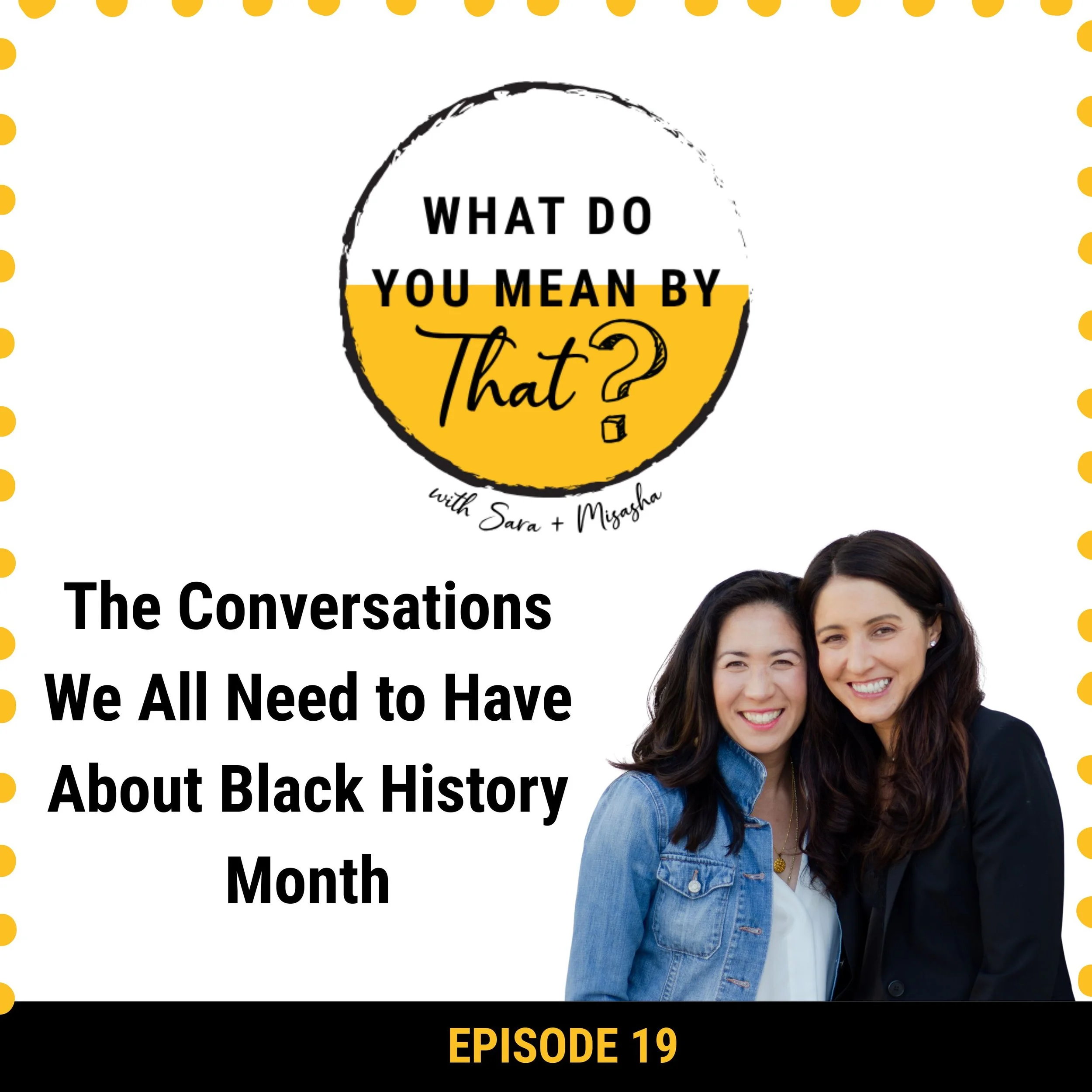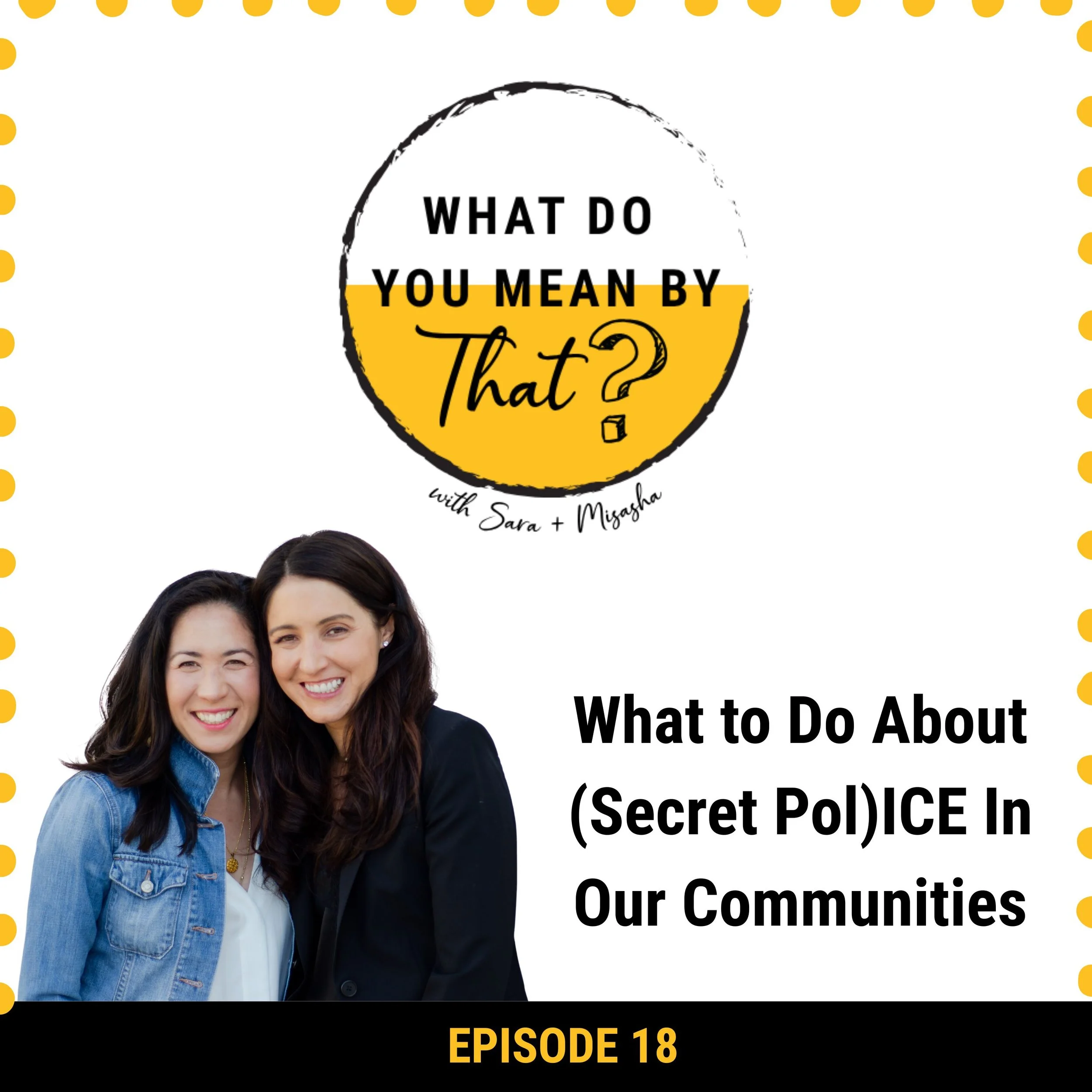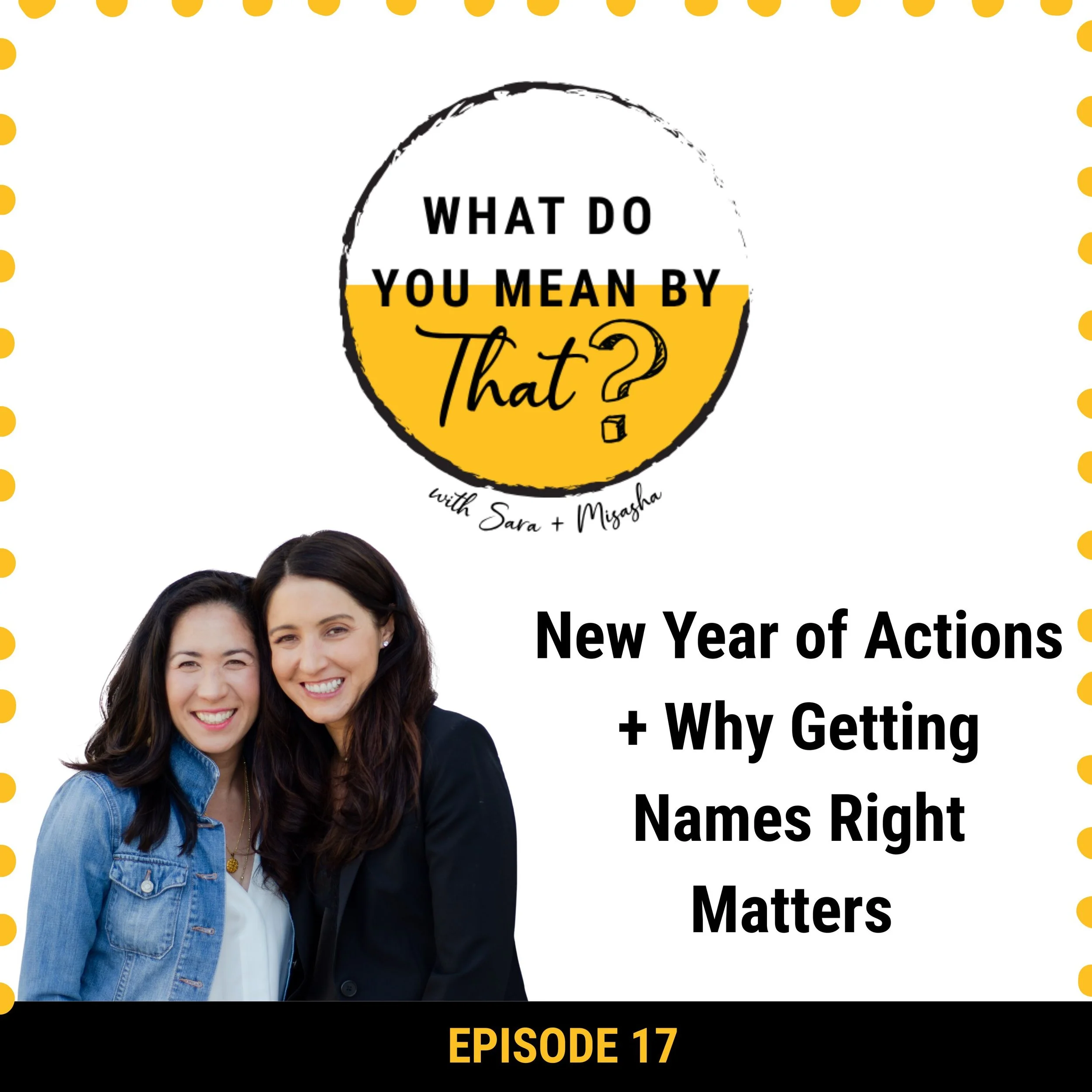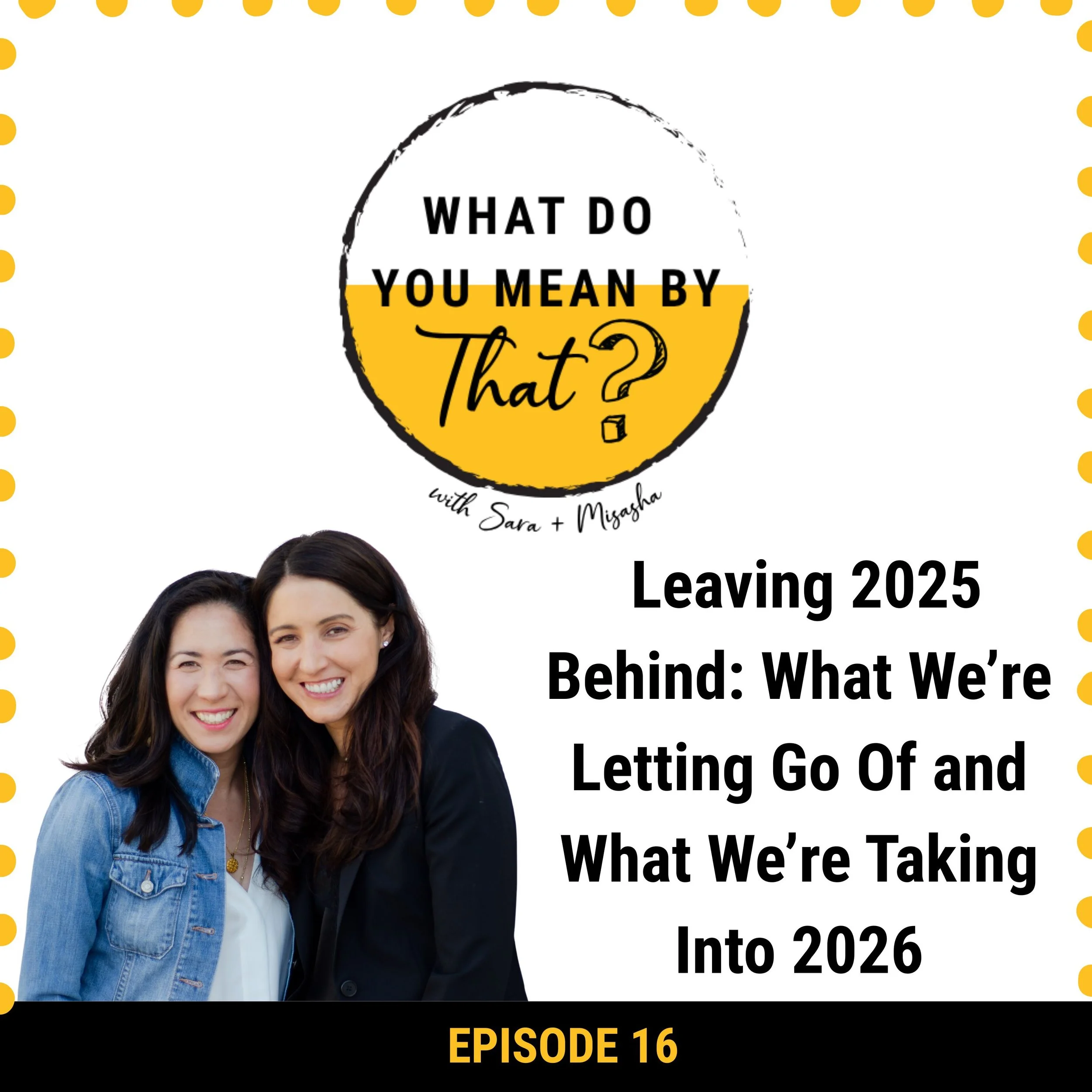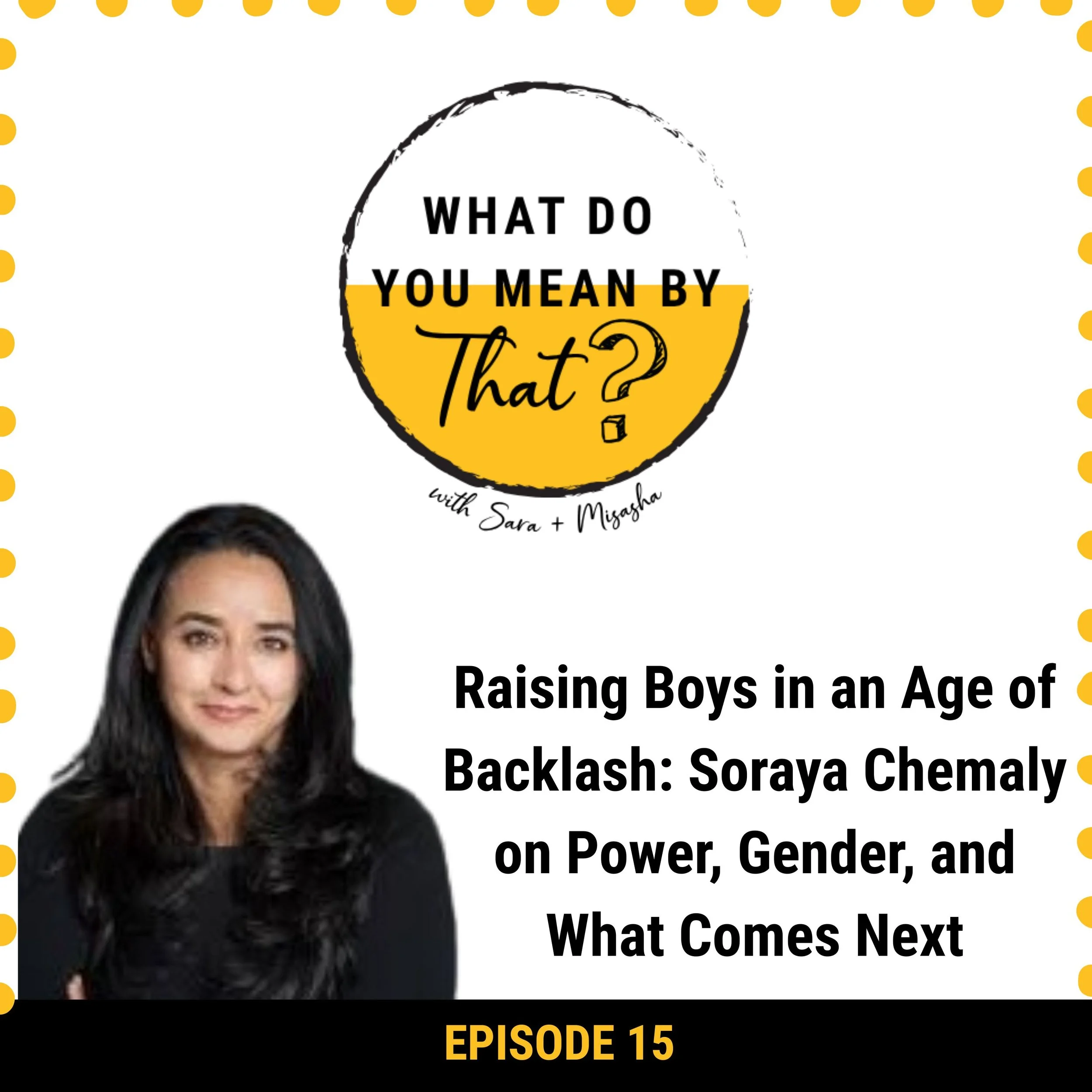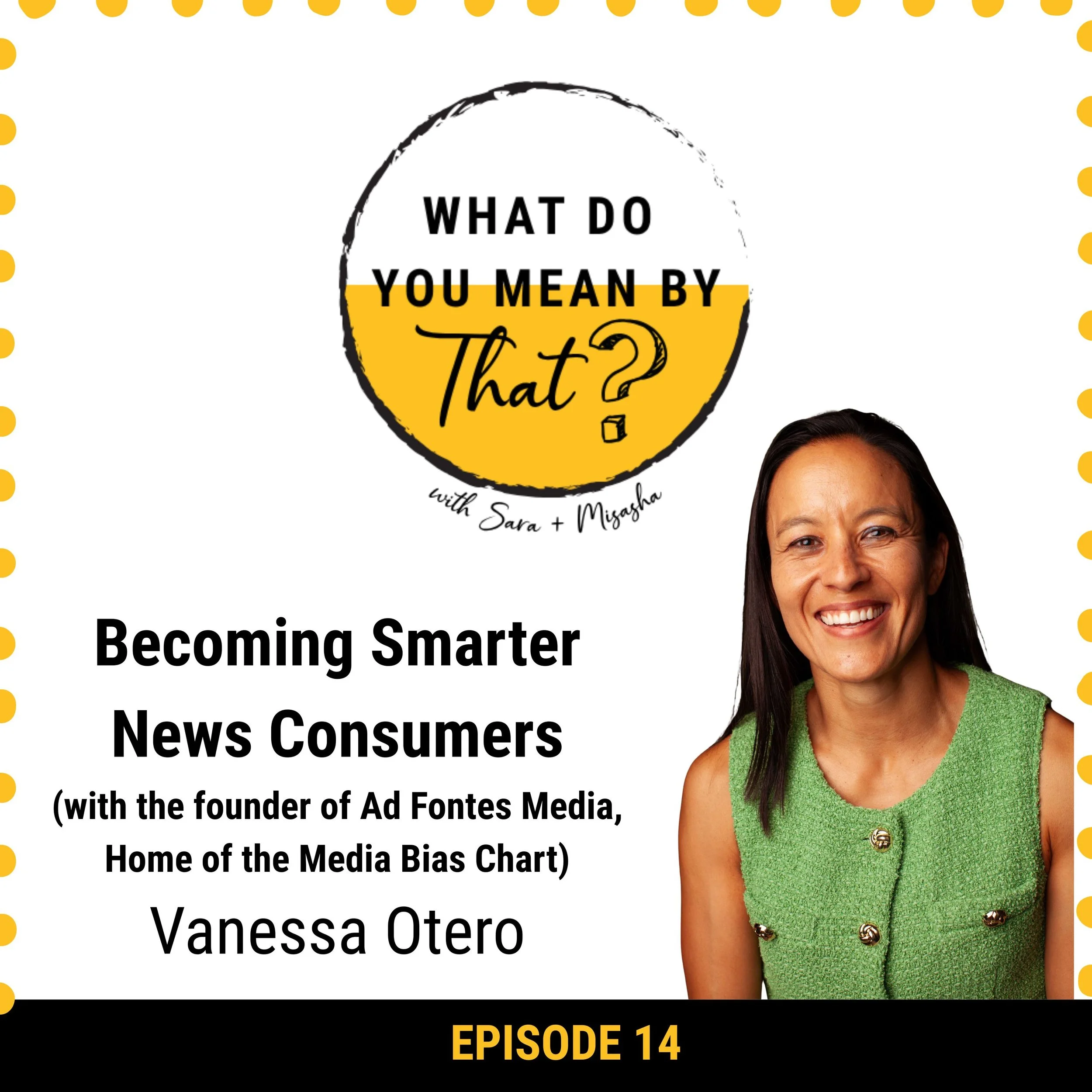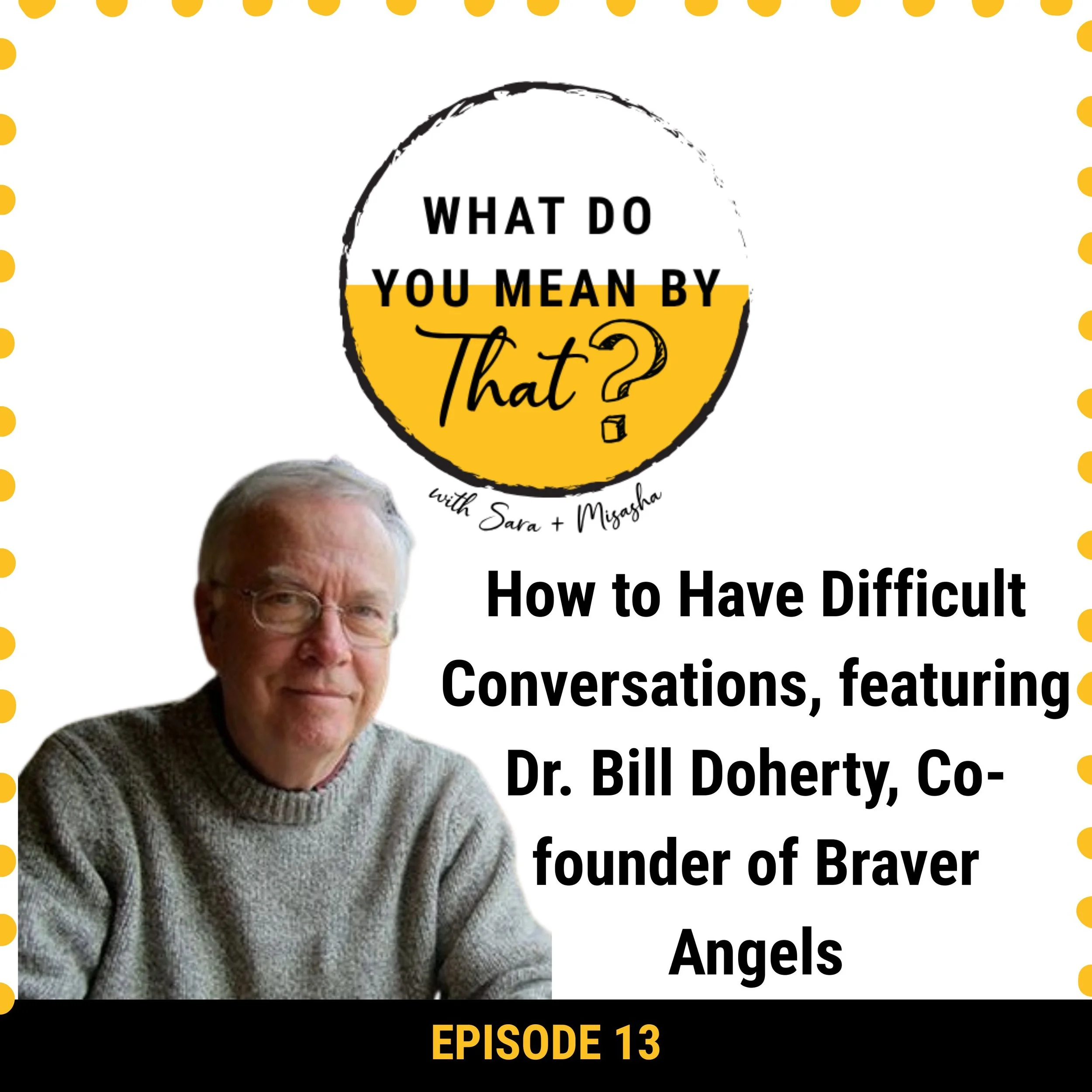19: The Conversations We All Need to Have About Black History Month
Here we are, February, which is also Black History Month (and for the record: Black history is American history. We’ll say this all day, every day, until everyone gets on this train.). It’s not lost on us that this is the shortest month of the year. It’s also not lost on us that, currently, our administration is actively erasing or whitewashing our nation’s history in real time, including this month itself, and we are being gaslit in the process.
So, this Black History Month, we encourage everyone out there to take a moment to learn our real history, expand the narrative of Black excellence in our country, and actively question the racist tropes and more subtle - yet still overt and noticeable - rewriting of history that is taking place. Many things can be true at once, including fear and the need to not stay silent. Listen in to hear more about what we think about that and simple ways to get these conversations started.
Read More
18: What to Do About (Secret Pol)ICE In Our Communities
IHorns honking, people chanting ICE OUT as they crowd busy intersections.
Horns honking, ICE agents smashing car windows, and grabbing people from their cars.
Which scenario sounds like the America you know?
Which one, more importantly, sounds like the America you want to be fighting for?
Regardless of what you answered, this episode is a must-listen. We unpack the history of ICE (it’s not a long one, despite what might be suggested by our current administration), why ICE acting as the secret police for the administration is not only incredibly illegal today but also reminds us of another secret police which rhymes with Schmestapo, and what we can all DO about ICE in our communities, especially when it seems like we have no agency.
Read More
17: New Year of Actions + Why Getting Names Right Matters
If you’re a repeat listener to the podcast over the last almost SEVEN years, you know that sometimes, we’ve done seasonal arcs in which we focus on a topic or theme for the season. (And if you’ve just found us - hello!)
This year, we’re doing something different: a year-long focus on action, which is the third pillar of our listen, learn, and act framework. It moves us from “what can I do?” to “here’s how I show up.”
We’ll take the things that you’ve been curious about (but didn’t want to ask about, maybe), break down the history behind them, and walk you through why these things matter.
And then we’ll throw in tips on how, now that you know about them, you can make small changes in your own lives to make a huge impact in your communities and in the fight for all of us.
We’re in it to win it this year. Hope you’ll come along for the journey.
Welcome to 2026, and a whole new year of What Do You Mean By That? - the podcast about asking better questions, having deeper conversations, and taking action that helps all of us. Make sure you’re signed up for our newsletter to catch all the details in between.
Read More
16: Leaving 2025 Behind: What We’re Letting Go Of and What We’re Taking Into 2026
We’ve had rough years before—but 2025? This one hit different.
If you’ve been listening to us for the last six years, you know we’re no strangers to hard conversations. DEI. Wellbeing. Systems that don’t work the way they should.
And this year pushed all of that—from the global to the deeply personal.
So what did we learn when everything felt heavier than usual?
Let’s talk about the biggest lessons this year forced us to learn - what we’re leaving behind in 2025, and what we are carrying forward, with purpose, into 2026.
Read More
15: Raising Boys in an Age of Backlash: Soraya Chemaly on Power, Gender, and What Comes Next
In today’s episode, we sit down with feminist author and activist Soraya Chemaly for a conversation that feels both urgent and deeply grounding. Soraya’s new book, All We Want Is Everything, traces how male supremacy shows up everywhere—our politics, our homes, our faith spaces, our workplaces, and especially in the lives of our children.
Together, we talk about the rising backlash against women and queer people, the ways boys are being pulled into misogynistic online spaces, and why so many young men are drifting toward anti-democratic movements without even realizing they’re being manipulated. Soraya offers a powerful reframe for what we’re seeing culturally, along with real, everyday actions that families can take to disrupt old gender scripts—on sports fields, around dinner tables, and in the tiny moments we rarely name but constantly repeat.
This conversation is challenging, hopeful, beautifully honest, and filled with the clarity that can actually shift how we move through the world.
Let’s dive in.
Read More
14: Becoming Smarter News Consumers, with the Founder of Ad Fontes Media, Home of the Media Bias Chart
In an age where AI can fake a video, social platforms reward outrage, and even the word ‘misinformation’ means different things to different people, one question rises above the noise: how do we know what to trust?
Today, we’re joined by Vanessa Otero, the lawyer-turned-media-analyst behind Ad Fontes Media and its well-known Media Bias Chart, to explore exactly that. Vanessa takes us inside the mechanics of bias, the structures driving extreme content, and the habits that actually make us smarter news consumers. This episode is your practical guide to staying informed without getting manipulated.
Read More
13: How to Have Difficult Conversations, featuring Dr. Bill Doherty, Co-founder of Braver Angels
Are you a little worried about holiday conversations with your relatives and family members in this increasingly polarized political climate? You’re not alone.
Welcome to something new – a live discussion with our guest, Dr. Bill Doherty, co-founder of Braver Angels and a deeply experienced relationship therapist, coaching one of us (Sara) through how to have difficult conversations, not in theory, but with an actual extended family member who has differing political viewpoints from me.
Nowadays, politics is personal. So, as much as it's tempting to bury our heads in the sand, these conversations are skills of democratic living - we can’t abandon them at a family level and expect our political leaders to do it for us.
You won’t want to miss the discomfort, the realizations, the tips and perspectives that can help us ALL have better, more meaningful connections and conversations with the people we love in our lives – even and especially if we don’t always agree with them.
Read More
12: Uncompete: The Case for Redefining Success, Together - with Ruchika Malhotra
When we have repeat guests back on the pod, it’s because we love them, their work, and the message that they’re not only sending out into the world but embodying themselves. And we think all of this can be said a million times over for today’s guest and her brand new book (out today!).
As we think about this conversation, which we can’t wait for you to listen to, there were those mic drop moments, but there were also those contemplative moments where we were not only deep in conversation, but we really felt the power of this notion of uncompeting. We can’t wait for you to feel this too, as you listen to our conversation with Ruchika Malholtra about her new book Uncompete and why we should all be redefining success together.
Read More
11: What We Meant By That - The Debrief on Elie Mystal’s Brilliance
Welcome to our first Debrief episode, where we reflect and digest what our brilliant guests shared in a prior conversation.
We were blown away by the sheer brilliance and clarity in our last episode with former litigator and political commentator Elie Mystal, author of Bad Laws and Allow Me to Retort. We’ve read and recommend both books, and especially want Bad Laws to get in the hands of our Democratic lawmakers for whenever (fingers crossed) they get back in power.
But say you don’t have time or desire to go back and listen to a full hour of incredible insights. We pulled out some of the key quotes that hit us hard, and we’re gonna get into our thoughts on them.
Read More
10: Elie Mystal on Bad Laws, Big Truths, and How to Change the System
This episode is a must-listen for anyone who’s ever felt like legal talk is impossible to understand (👋 Sara included!). We’re joined by Elie Mystal, brilliant legal mind, powerful truth-teller, and New York Times bestselling author of Allow Me to Retort: A Black Guy’s Guide to the Constitution, to break down the complex world of American law and what Democrats are doing all wrong (and can do better) in a way that’s sharp, accessible, and even funny.
💥 He’s back with a bold new book: Bad Law: Ten Popular Laws That Are Ruining America. If you're fired up about the state of our country, about policy that is working frighteningly as intended, or simply want to understand how certain laws are quietly shaping (and harming) everyday life, this conversation is for you.
Read More
09: The Devil Emails At Midnight, With Mita Mallick
Whether you’ve ever been a boss or have ever had a boss, you know how much those singular individuals can shape the workplace. According to studies, a good manager can increase employee engagement by as much as 70%. And, according to a survey by the American Psychological Association, a whopping 75% of employees report their boss as the worst and most stressful part of their jobs.
So, how do we know if we’re being a good boss or a bad boss? Do we just know, or should we be looking out for specific things?
Enter the incredible stories that focus on what good leaders can learn from bad bosses, featuring the author of the brand-new book, The Devil Emails at Midnight, Mita Mallick.
Read More
08: How to Be a Better Human: What WE Really Think
We had a very insightful superfan make a brilliant suggestion that we’re acting on, starting with this episode. David Gaines, author of Radical Business, CEO of La Terza Coffee, and kind human being, sent in a message cheering us on for the podcast rebrand, and then pushed us to do just a bit more. Specifically, he said, “The guests you have on clearly have their brilliance to add to the world, but for me personally, the main reason I listen to your work is that I find a lot of brilliance in your perspectives as you process in real time what your guests are saying.”
Considering that while we are deeply curious human beings who are pretty darn good at interviewing people, we are ALSO speakers who very much have our own brilliant perspectives - his words, not ours - too. So, David, thank you. We’re going to weave in more episodes with our thoughts, reflections, and actions based on what we learn from our guests going forward!
In addition, this fall, we’re working on something new for our newsletter subscribers, so make sure you’re subscribed to be the first to hear about it!
And if you’re more of an audiophile, based on the fact that you’re listening to this podcast, take a moment to check the link below to leave an audio recording of your feedback on how we can make this podcast the best it can be for YOU!
Read More
07: How to Rest without Feeling Guilty
In our last episode of our series on how to be a better human, we’re talking about rest. Specifically, what do we mean by rest, and why is it so important? How do we grapple with its significance in our individual and collective lives, and for real, how do we DO LESS?
This conversation has become increasingly frequent in our lives, and we wanted to share our thoughts with you. If this resonates, please share with your friends, and tell us how you incorporate rest, in whatever form, into your lives as well.
Read More
06: How To Be a Better Democrat, with Megan Imperial
Maybe these are some questions you’ve asked yourself, as we’ve moved from the election of 2024 to the present: Where the heck are the Democrats? What’s happening with the dysfunctional American two-party political system, and if we don’t support what the Trump administration is doing to our people and our rule of law, how do we find any hope we might have left for regaining control of our Democracy? What do we even mean when we say Democrat these days?
We’ve asked ourselves the same questions and have come up empty. As a result, we decided to ask these very same questions of a Democratic insider, as this week we discuss how to be a better Democrat.
Read More
05: How We Can Build Trust In Times of Division, with Jan-Emmanuel de Neve
It’s not controversial to say that we are living in times of deep division, where there are so many forces keeping us apart, politics being a big part of that. But did you know that there’s a link between how satisfied you think you are with your life, how much you trust others, and how you vote? It’s a mind-blowing, less-discussed topic, despite being a chapter in the latest World Happiness Report. Importantly, to make a difference, we wonder this - how do we actually build trust with people who hold different viewpoints, especially if our first impulse is to block them, disregard their comments, or ignore them entirely?
We’re so glad today to have one of the co-authors of the World Happiness Report here to talk with us about how we can use our understanding of wellbeing and trust to build stronger communities, reconnect with each other, and also bridge the politics of division.
Read More
04: How to Improve Your Critical Thinking Skills, with Colin Seale
Depending on who you are and where you get your news from, you may be seeing a completely separate version of the news from your neighbor down the street, your aunt in another state, or your coworker who only gets his news from a specific social media platform. Maybe everyone around you gets the same news you do. But you also know that there is a very different version of reality out there, that many people are deeply believing in.
So, how do we figure out what’s true and what’s convenient? How do we talk to each other if we don’t have the same baseline of understanding about, perhaps, anything? We’d argue that this is where critical thinking skills come in. But what do you mean by critical thinking skills?
We’re glad you asked. This episode is for anyone who wants to think deeper about what we mean when we say critical thinking skills and how we can use them to bridge the divides in our communities, our country, and maybe even in our own households.
Read More
03: How to be Kinder (not Nicer), with Dr. Kelli Harding
This is Sara, and I remember the time 20 years ago when I got schooled by a psychoanalyst. It must have been the fall, because I was supremely agitated that I was having to write, design, and send holiday cards out to a huge list of people all by myself, without the help of my fiancé. If you know me, you know that cards were a staple of my winter growing up, with cards from my parents’ friends stapled onto long felt ribbons hanging down each doorway, surrounding us with love and smiling faces for weeks on end. The therapist asked if I could just not do them, if it was annoying me so much, and my instant fury was revealed: Are you kidding? I have to send these cards out, it’s the nice thing to do!! Cut to the point, and it’s this - nice according to who? Nice for whom? Certainly not nice for me, if I were going to be resentful and pissy about it. I came to terms with the fact that I actually just really enjoyed writing and sending cards out to people who warmed my heart that year, and that my partner wasn’t a nice person for not agreeing to send these cards out with me.
But it leads us to ask this. What do we mean by niceness - and what, more importantly, is its not-as-related-as-it-seems and so much more important character trait of kindness? How can understanding this difference and leaning into kindness help us be better people?
Read More
Ep. 02: How to Become a Radical Listener, with Robert Biswas-Diener and Christian van Nieuwerburgh
One of the ways that we believe we can be better humans is to actually listen to each other - not just nod along when we watch people’s mouths move, or wait impatiently for someone to finish their thought before we can jump in and say what we’ve been dying to say - but actually listen to what they’re saying, take a moment to reflect on that, and respond. Perhaps you ask a clarifying question, perhaps you share a reflection, perhaps you simply agree and ask for more details. Regardless of your response, if you’re really listening, people will know and will see you in a better light as a result.
If you’re curious about how to be a better listener, we offer two experts on the topic who help us understand: What do you mean by radical listening?
Read More
Ep. 01: Welcome to What Do You Mean By That?
We have a big announcement! We have rebranded and are now known as the podcast, What Do You Mean By That?
If you’ve listened to our former show, Dear White Women, you know that What do you mean by that? has been one of our favorite questions to use to interrupt people in a healthy way, spur on conversation, and cue ourselves to listen.
Our purpose has always been to help our society realize that it’s all of us or none of us. That a world that is good for those who are most systematically oppressed is a world that’s good for all of us. After 272 episodes, we’ve come to understand just how intertwined the systems are that hold us together and keep us apart.
This is a show dedicated to helping folks talk smarter and think deeper about the world around us - even when information is flying at us at warp speed. We will not let the fire hose overwhelm us. Whether it’s about science, history, current events, social justice, or more, our community consists of people who want to be better humans, and we want to explore all the conversations in a succinct way so we can cut to the chase and help us all be better, together, for all of us.
We can’t wait to keep asking, along with you: What do you mean by that?
Read More

